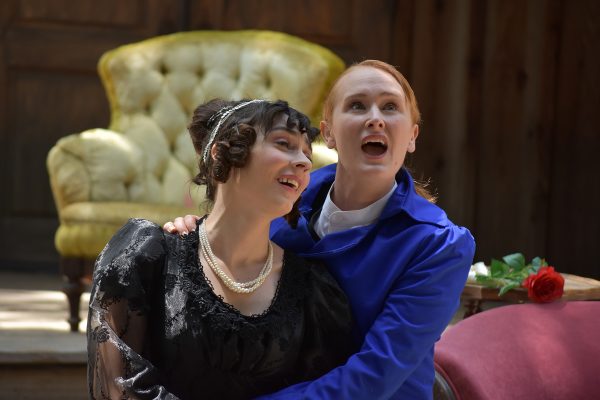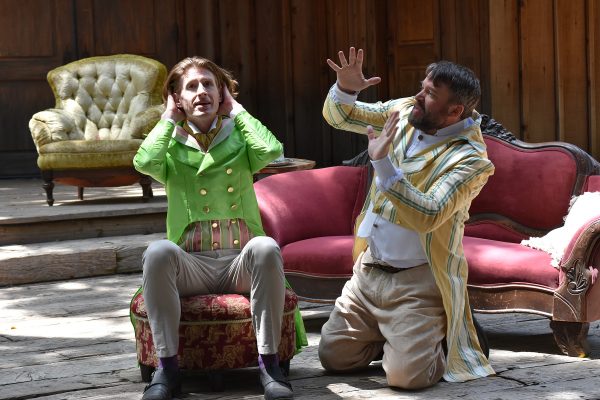Many of Shakespeare’s comedies are, if not the food of love, then certainly the fuel of fun and mainstay of summer theatre, especially when it’s al fresco, and the weather cooperates, which it very much has so far this year.
Looking closely at the most popular of his comedies, you will find that Shakespeare relied on plenty of strikingly similar zany antics among them. Consider A Midsummer Night’s Dream, Much Ado About Nothing, As You Like It and, despite its wintry title, Twelfth Night. All include mistaken identities, disguises, soldiers and sages, sisters and brothers, lofty peers and silly peons and, in Comedy of Errors, even twins.
At Theatricum Botanicum this summer, Shakespeare was represented by Twelfth Night and A Midsummer Night’s Dream, both of which benefit vastly from the Theatricum’s natural canyon setting. The Dream has ended its run as of this writing, but a spirited Twelfth Night is still running. If it is a little disjointed and ragged around the edges, so be it. The totality of the experience, especially at the mellow 4pm show (which I attended), combines with surrounding nature to induce relaxation and a forgiving mood.

A little forgiveness is often in order at Theatricum, although this Twelfth Night cast, lead by Max Lawrence’s well-spoken Orsino and Willow Geer’s expressive Viola, is especially well supported by the raucous quartet of the blustery Christopher Jones as Sir Toby Belch, Frank Weidner’s weasely Andrew Aguecheek, Time Winters’ senior Feste, and Elizabeth Tobias’ gamine of a Maria. Together, these rascals deliver the comic backbone on which to hang the more delicate romances of the play. Director Ellen Geer’s cast being a talented mix of youth and age, all with energy to spare, substitutes here and there for the frequent absence of detail in these rustic productions—fitting right in with the untamed environment.

For reasons of her own, Geer decided to skip the familiar first line, “If music be the food of love, play on,” to begin the performance with just music, relegating the spoken words four lines in, with Orsino exclaiming “That strain again! It had a dying fall…”
It’s a minor change that is there more for the sake of change than anything else. A very major change in this production, however, was made by handing the male role of Malvolio, Olivia’s steward who secretly loves his mistress, to a woman. That woman happens to be Melora Marshall, always a welcome fixture of this company. And despite the major challenge to logic and pretty much everything else created by this gender switch, she not only pulls it off, but emerges triumphant.
So why this casting decision and why not, at a minimum, feminize the name from Malvolio to Malvolia? I’ll never know. Marshall defies the steep odds by acquitting herself with boldness, bravery and terrific panache. She owns some of the funniest scenes. So perhaps questioning this move has just run out of steam, since the golden rule of the theatre is that it has no golden rule. Anything goes, as long as it works.

Two other directorial choices fare less well. The first is the shipwrecked Viola’s opening scene, when she’s just swum ashore in Illyria, in a scene intended to introduce her to the audience and deliver a good deal of important information. So what do we get? In this production, it is played behind rather than in front—or even to the side—of the audience. No one was passing out periscopes or rear-view mirrors and very few necks were successfully craned. To call this a mystifying idea is to be kind.
The second innovation was the injection of brief phrases of original music by Marshall McDaniel—snippets really—under some of the dialogue. A program note describes the addition as producing “emotional moments [that] will take flight by lifting the beautiful text… into song… the next step up in elevated language, inviting all to revel in the plain delight of being human.”
It’s a lofty ideal, but also a bridge too far. Its primary effect would seem to be to interrupt the general flow of the action, more a distraction than an asset. The play’s final song, that one ordained by Shakespeare, is elevation enough.
Still, between the surroundings, Melora Marshall’s superb comic turn, and the general transport and enthusiasm of the company, there is plenty here to recommend for a pleasurable time. Some of the final scenes were shrunk for time and interest to no great disadvantage. Let’s give Sean McConaghy’s feisty portrayal of Antonio full credit for speaking loudly and clearly what may be the most exalted rhymed couplet to be found in all of the incalculable richness of Shakespeare’s writing:
“In nature there’s no blemish but the mind./None can be called deform’d but the unkind.”
Words to live by.
Top image: Melora Marshall in a daring performance as Malvolio in Twelfth Night at Theatricum Botanicum.
Photos by Ian Flanders
WHAT: Twelfth Night
WHERE: Theatricum Botanicum, 1419 No. Topanga Canyon Blvd., Topanga, CA 90290.
WHEN: 8/24, 8pm; 9/1 & 28, 8pm; 9/7, 15, 21, 4pm. Ends 9/28.
HOW: Tickets available at 310.455.3723 or online at www.thearicum.com. Lower Tier: $42. Upper Tier: $26. Seniors 65+, students, vets, teachers & AEA members: $25/$15. Children 5-15: $10. Children 4 and under: FREE. Friday evenings: Pay-What-You-Will.
FOOTNOTE: Audience members are invited to arrive early and picnic in the Theatricum’s terraced spaces. They also are advised to wear comfortable shoes, dress casually (warmly for evenings), bring cushions for bench seating, hats for sun and repellent for flying insects.
